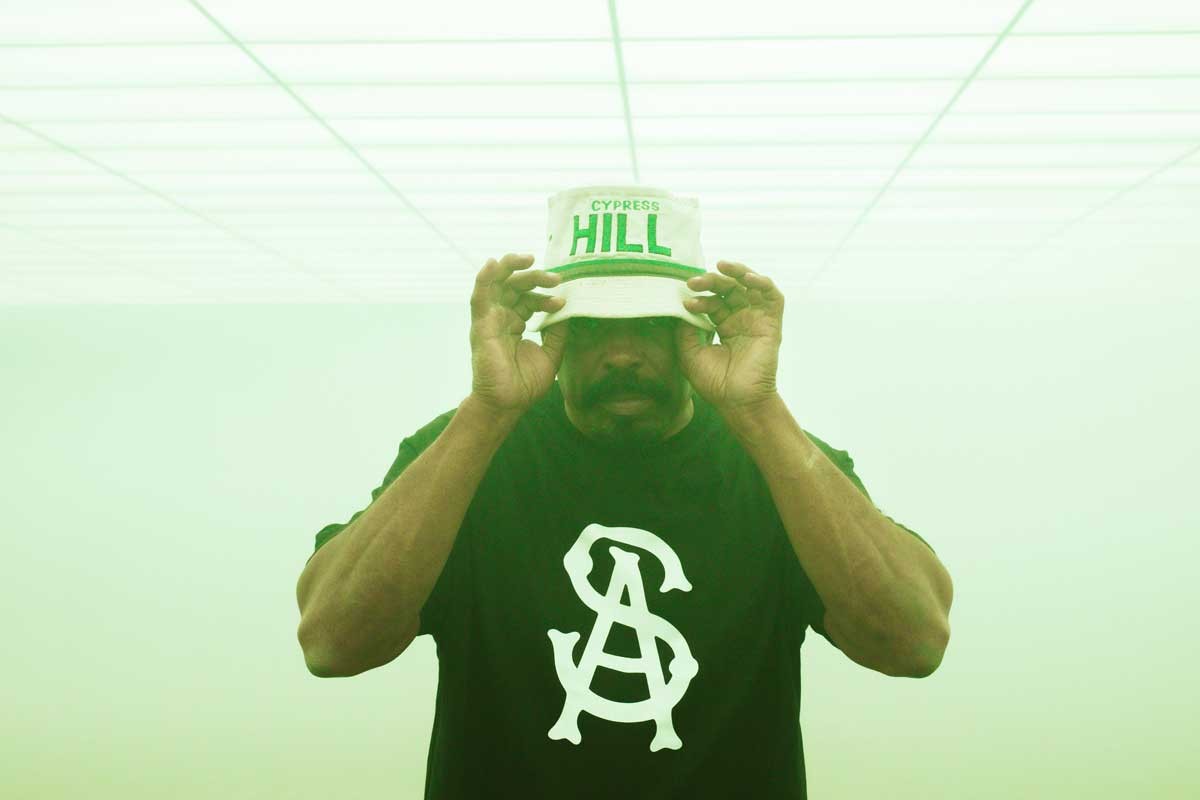It took three decades, but Cypress Hill’s love for Detroit has come full circle. In 1991, the Latino hip-hop stoners dropped their debut album and landed a slot on Lollapalooza the next summer. Motown was the third stop on the tour, and the group wasn’t sure how people outside of California would respond live. Or if they’d even show up.
Detroit showed up.
“They’ve always shown this unwavering love and support for us,” Senen “Sen Dog” Reyes says by phone. “Which is all you could ask for as a musician.”
To help celebrate 4/20, Cypress Hill — rounded out by nasally MC B-Real, percussionist Eric Bobo, and this tour’s scratcher, DJ Lord — is playing a show Tuesday at The Fillmore. They’ll be joined by fellow West Coast legends the Pharcyde and Souls of Mischief.
Above all else, a performer’s job is to win over the crowd. Standing on stage and saying a given room has been the best night of the tour, or that the current city has purchased the most albums, are a few ways to do it. So when Reyes gushes about his reverence for Detroit, it might come off like lines he says to reporters to help move tickets.
It goes deeper than that. It’s genuine.
Being here takes Reyes back to his childhood. He loves coming in the spring and summer when the Tigers play, and if their schedules line up he’ll go to a game. One regret?
“I wish I could’ve gone to old Tigers Stadium because that’s what I used to see growing up,” he says.
When Cypress was first here, Reyes reconnected with a childhood friend who’d relocated to the city from his block on Cypress Avenue in South Gate, East L.A. He got a tour of the city, a glimpse of its history. Before this, his only exposure to Detroit was via sports. He grew up playing little league and watching Lou Whitaker, Lance Parrish, and Alan Trammel play for the Tigers on NBC’s Game of the Week.
He’s got nothing but respect for the Detroit Bad Boys, either. At the time, Reyes hated watching them and hoped his L.A. Lakers would rough up the Pistons but, well, that wasn’t the case. That respect took a while to form.
“I came to appreciate what they did because basketball doesn’t play like that anymore,” he says. “It was a game for men at that point.”
He loves Barry Sanders, and especially seeing the Lions do what they did last season. Reyes noticed the turnaround three years ago with GM Brad Holmes and head coach Dan Campbell and saw promise. Sure enough, he was right.
Reyes loves an underdog story and admires how diehard Lions fans are. The type who will tattoo the logo on their cheek during the Harrington years, for instance.
“People should pay attention to [Detroit] when it comes down to supporting a team and sticking with them for life like I do with my Raiders,” he says.
You could even draw a connection between the loyalty of Detroit’s sports fans to the loyalty of Detroit’s Cypress Hill fans. Thirty years on, Cypress has released 10 studio albums (four RIAA-certified platinum) and played no fewer than 15 shows in the metro area.
“You gotta bring your A-game to Detroit,” Sen says. “We appreciate the love and we’ve never forgotten what an important role [Detroit] has played in our careers.”
Prior to this, their most recent stop was 2019. One Saturday last summer, B-Real’s Dr. Greenthumb weed chain took over a Ypsilanti dispensary and the good doctor himself headlined the inaugural Spark in the Park festival that night.
“There’s no time that I’ve gone to Detroit and been disappointed,” Reyes says. “It’s always the same: 100% energy... It’s hard to compare to other cities.”
On 2022’s Back in Black, that energy manifested in a different way — Detroit’s Curtis “Black Milk” Cross produced the entire album, front to back. Versus prodigal founding member DJ Muggs’s layered, trippy, and textured beats on 2018’s Elephants on Acid, Back in Black is back to basics: classic boom-bap by way of Dilla’s hometown.
Reyes wasn’t familiar with Cross prior, but was quickly impressed by how chill and easy to work with he was. Cross’s open mind and collaborative nature — even working remotely — unlocked a type of collaboration Reyes and B-Real hadn’t experienced in ages. On the album, the two MCs share the mic on all but one song.
“He took us all the way back to our days on the block where we would just rhyme for the fun of it,” Reyes recalls. “When our original plan for the group was for B-Real and I to be on every song together. It reminded me of the late ’80s when we were just out there trying to get by and learn what we wanted to do.”
Each time they sent a WIP track to Cross, he’d get inspired by what the two had done lyrically and change the beat up to match. Reyes said when they got something back it was always markedly better than what they’d submitted. He didn’t name names, but it’s clear that not every working relationship has been like that. When they finally met in person, Reyes was impressed by Cross’s humility despite his reputation.
“A lot of respect goes to Black Milk and his openness for whatever we wanted to do lyrically,” Reyes says.
Collaborating with Cross gave Reyes a new type of appreciation for Detroit. Growing up his older sister was super into Smokey Robinson, and to this day Reyes still listens to him.
“Just knowing, just being able to work with somebody from that area gives you perspective of, ‘A lot of great music has come from the area where this guy is from,’” he says. “Very proud musicians have been able to claim the city. I’m definitely proud that part of our legacy goes back to [Detroit].”
The last time Cypress played Detroit was supporting Elephants on Acid in 2019. Even before the lights went down, the biggest cloud of weed smoke I’ve ever seen hung heavy over the audience. Not even the sold-out crowd for stoner metal pioneer Sleep’s 4/20 show in Albuquerque a few years ago could compare.
“That’ll show you who lives in [Detroit],” Reyes says. “They’re there, the 4/20 people. That’s one of the reasons we keep coming back.”
At one point, B-Real came out smoking a 14-inch joint. He congratulated the congregation on legalizing recreational cannabis. Since then, Detroit voters have decriminalized entheogenic plants and mushrooms and there are seemingly two dispensaries on every block, eager to sell to anyone 21 or over.
While our highways are haunted by billboards emblazoned with bad puns and Mark Savaya’s mug, it’s easy to forget the patchwork quilt of states across the country where marijuana is still illegal. Hell, even on this tour dubbed “We Legalized It” there are four states where you’ll break the law for sparking a bowl in your own home.
“It makes you feel like the struggle isn’t over, the fight isn’t over,” Reyes says, adding, “There’s still minds to open” — referencing the Back in Black track “Open Ya Mind.” It’s a song about the hypocrisy of California fully legalizing marijuana and the hassles of that not being the case federally. And it’s applicable anywhere marijuana has been legalized, not just the Golden Coast.
For Reyes, the tipping point will be when a state in the South allows cannabis for adult use. Alabama, Florida, Louisiana, and Mississippi all have medicinal marijuana, but half haven’t decriminalized yet. That’s not to say you can’t find weed there — people just have to be a little more secretive about it.
“It’s not as open as California, Colorado, or Nevada,” he says.
Still, progress is progress. Medical is usually the first step, and there’s no way southern states can ignore the taxes recreational states are pulling in for much longer. Last year Michigan marijuana tax revenue was $87 million.
“A lot of time the biggest step it takes is to have that first door open up, and then see what that develops into,” he says.
When Cypress started 30-some years ago, Reyes didn’t know if he’d live to see the day when California went fully legal. Rumors persisted for years, Reyes says. But it took until 2016 for Proposition 64 to pass.
“That gives me hope for the rest of the country,” he says. “It’s not just about getting stoned.”
It’s about the agricultural benefits of hemp and taking direct action about the overcrowded prison system in the U.S., too.
“We try to make people understand this is a win-win for everybody involved,” Reyes says.







